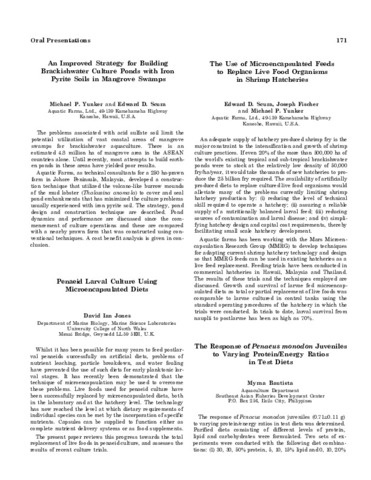The response of Penaeus monodon juveniles to varying protein/energy ratios in test diets
Share
Abstract
The response of Penaeus monodon juveniles (0.71±0.11 g) to varying protein/energy ratios in test diets was determined. Purified diets consisting of different levels of protein, lipid and carbohydrates were formulated. Two sets of experiments were conducted with the following diet combinations: (1) 30, 30, 50% protein, 5, 10, 15% lipid and 0, 10, 20% carbohydrate and (2) 40, 45, 50% protein, 5% lipid and 20, 25, 30% carbohydrate. Protein and energy ratios ranged from 89-198 mg protein/Kcal while the energy values for all diets were 165-415 Kcal/100 g. The diets were given twice daily at 10% of the body weight.
Results showed that a two- to three-fold increase was observed in the body weight of prawns fed with diet combinations of 40-50% protein, 5-10% lipid and 20% carbohydrate with energy values of 285-370 Kcal/100 g. Reduction in protein content of the diet from 50 to 40% while maintaining the total energy level (285 Kcal/100 g) resulted in a change in growth that was not significant. An increase in energy level, at constant dietary protein level, resulted in improved utilization of protein and feed conversion efficiency.
Description
Abstract only.
Suggested Citation
Bautista, M. (1985). The response of Penaeus monodon juveniles to varying protein/energy ratios in test diets (Abstract only). In Taki Y., Primavera J.H. and Llobrera J.A. (Eds.). Proceedings of the First International Conference on the Culture of Penaeid Prawns/Shrimps, 4-7 December 1984, Iloilo City, Philippines (pp. 171-172 ). Iloilo City, Philippines: Aquaculture Department, Southeast Asian Fisheries Development Center.

